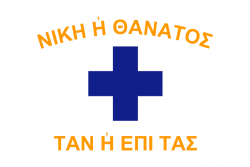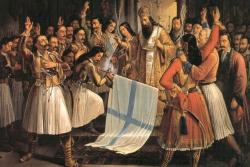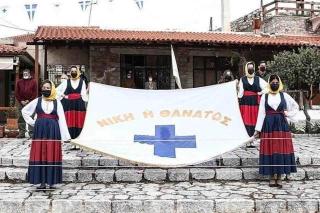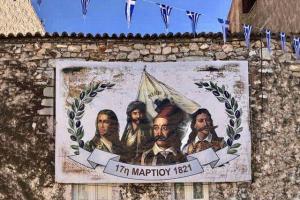25th March 1821 - 2021
 Greece will celebrate the 200th Anniversary of the start of the Greek War of Independence on 25th March 2021. Although this is the ceremonial date of the Greek rebellion against the Ottoman Empire, the uprising did not start in Kalavrita on 25th March as is often believed. Although that date was later designated as the beginning of the War of Independence, revolutionary acts had taken place in areas across the Peloponnese as early as mid-March 1821. According to oral testimonies, the uprising actually started in the Mani region, the first area to declare open revolution. Their declaration was in line with the plans of the secret revolutionary society Filiki Eteria, founded in 1814 in Odesa, by Greeks whose purpose was to overthrow the Ottoman rule of Greece and establish an independent Hellenic state.
Greece will celebrate the 200th Anniversary of the start of the Greek War of Independence on 25th March 2021. Although this is the ceremonial date of the Greek rebellion against the Ottoman Empire, the uprising did not start in Kalavrita on 25th March as is often believed. Although that date was later designated as the beginning of the War of Independence, revolutionary acts had taken place in areas across the Peloponnese as early as mid-March 1821. According to oral testimonies, the uprising actually started in the Mani region, the first area to declare open revolution. Their declaration was in line with the plans of the secret revolutionary society Filiki Eteria, founded in 1814 in Odesa, by Greeks whose purpose was to overthrow the Ottoman rule of Greece and establish an independent Hellenic state.
On 13th March, even before the Mani uprising, Laskarina Bouboulina, a Greek naval commander from Spetses, raised her Greek battle flag on her flagship Agamemnon, and on 3rd April sailed her fleet of eight warships to blockade Nafplio, that was occupied by Ottoman forces. Later, Bouboulina, a national hero, led her fleet to assist in the relief of Monemvasia and to the blockade of Pylos.
On 17th March, Petrosbey Mavromichalis called upon all the Maniot chieftains to gather in Tsimova (today's Areopolis) and decided to begin the fight against Ottoman rule and occupation. This soon led to the quick and bloodless liberation of the regional capital city of Kalamata on 23rd March. The proclamation of the revolution at Tsimova-Areopolis was according to local oral tradition, since there are no written testimonies or documents of this monumental event. However, every year on 17th March, a ceremony in Areopolis attended by the President of the Hellenic Republic commemorates the fateful beginning of the Greek Revolution of 1821.
The flag featured above was used by the fierce freedom fighters of the Mani peninsula in 1821 when they declared the start of the revolution and liberated Kalamata. This flag had the words 'Victory or Death' and the ancient Spartan motto 'With it or upon it' in reference to a warrior's return from battle with his hoplon shield. Another flag that was used by Hellenic revolutionaries from 1770 and during the early years of the 1821 rebellion was the Kolokotronis family flag, as seen in the famous Agia Lavra painting below.
Metropolitan Germanos III of Old Patras declared war at the Agia Lavra Monastery, near Kalavrita, blessing the freedom fighters and their white flag with a blue cross. This signified that this was not only a war for freedom, but also a war of faith, as the Hellenic revolutionaries then marched on and liberated Kalavrita. 17th March is given by historians for this event, although Greeks chose 25th March as the historical day, so the beginning of the war would coincide with the feast of the Annunciation of the Virgin Mary.
 25th March, the feast day of the Annunciation, had been chosen as the official start of the revolution by the leader of Filiki Eteria, Alexander Ypsilantis, as 'evangelising the political liberation of the Hellenic nation'. In 1822, the provisional government occupying Corinth, decided to celebrate the anniversary of the revolution on the same day as Easter, 2nd April, in the old Julian calendar. Celebrations took place in Corinth with a military parade, festive church services and loud cannon fire. The historic church service held at Agia Lavra in the Peloponnese, led by Metropolitan Germanos of Old Patras, where the men swore an oath of 'Freedom or Death' has gone down as the 'official' declaration of the start of the rebellion, so since 1823, 25th March has been celebrated as the formal starting date of the revolution.
25th March, the feast day of the Annunciation, had been chosen as the official start of the revolution by the leader of Filiki Eteria, Alexander Ypsilantis, as 'evangelising the political liberation of the Hellenic nation'. In 1822, the provisional government occupying Corinth, decided to celebrate the anniversary of the revolution on the same day as Easter, 2nd April, in the old Julian calendar. Celebrations took place in Corinth with a military parade, festive church services and loud cannon fire. The historic church service held at Agia Lavra in the Peloponnese, led by Metropolitan Germanos of Old Patras, where the men swore an oath of 'Freedom or Death' has gone down as the 'official' declaration of the start of the rebellion, so since 1823, 25th March has been celebrated as the formal starting date of the revolution.
After 9 years of bitter war, Greece was finally recognised as an Independent State under the Treaty of London in February 1830. However, it was not until the London Protocol on 30th August 1832, signed by Britain, France, Russia and the Ottoman Empire that ratified the May Treaty of Constantinople. This established a new Greek Kingdom, making Otto of Bavaria the first King of Greece.
25th March, today also commonly known as 'Independence Day', is celebrated as a public holiday in Greece and Cyprus. The public holiday was established in 1838 with a Royal Decree by the Hellenic government, with King Othon and Queen Amalia, many foreign ambassadors, political and military authorities and a 'mass of people' attending the first celebration in Athens. Usually celebrations include parades by school children and celebratory events, with the largest event being the military parade in Athens.



The President of the Hellenic Republic, Katerina Sakellaropoulou, paid an official visit to Areopolis on Wednesday 17th March 2021 to attend the celebrations for the Bicentennial of the Greek War of Independence. After attending a memorial service presided over by the Metropolitan of Mani, Chrysostom III, and laying a wreath in the 'Square of the Immortals', the President of the Republic went to the square of 17 March, where she unveiled a special relief titled 'The swearing in of the Mani Fighters of 17th March 1821'.



Ermioni decorated the whole town with large banners showing images of the Greek War of Independence heroes.
The Greek Government announced that there would be no parades by school children or students on 25th March 2021, only the military parade will take place in Athens.